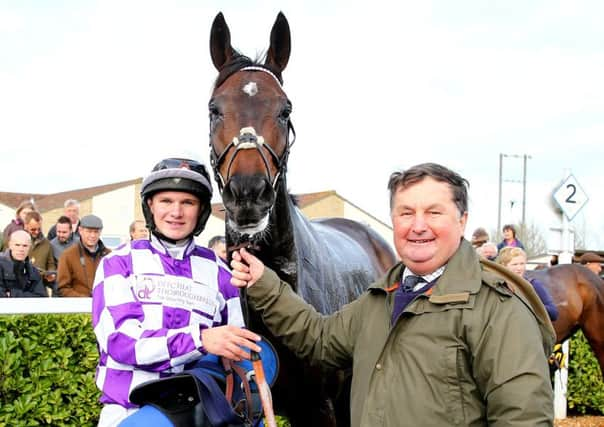Obituary: Sam Morshead, professional jockey, clerk of course and hugely successful Perth racecourse manager


Sam Morshead who has died aged 63 was a leading jockey who later enjoyed a highly successful career in racecourse management at Perth.
While in the saddle he rode over 400 winners and twice finished fifth in the jockeys’ championship, in seasons 1980-81 and 1982-83, the latter his most successful one with 62 winners.
Advertisement
Hide AdAdvertisement
Hide AdHis name is most associated with leading trainers Fred and Mercy Rimmell for whom he rode most of his career. Having had to stop racing for medical reasons, he was one of the first professional jockeys to become a successful Clerk of Course and general manager, initially briefly at Ayr and thereafter at Perth.
He transformed the racecourse’s fortunes, increasing attendances, introducing new events, attracting quality riders and trainers and overseeing about £6 million pounds of investment in improved facilities.
In 2014 Perth was voted “The Best Course in Scotland and the North East” while he was awarded an “Outstanding Contribution Award” by the Pride of Racing for his work. In 2017 he was appointed MBE for services to horse racing and charity. He was always quick to acknowledge the support he enjoyed from all staff at Perth.
Reflecting on his period in charge, he modestly commented, “I was blessed with the ability to get others to do things for me, I could ‘talk the talk’, and people having fun here was the lifeblood of the place.” An extremely personable and likeable individual, his popularity among staff and racegoers alike was undoubtedly a big factor in Perth’s success story.
Born Samuel Rodd Morshead in County Meath, Ireland to Cornish parents who had moved there attracted by the hunting and fishing, he had a sister Lucy and brother Hugh.
Initially he attended school in Drogheda before Twyford Prep School in England and then returning for secondary education to St Columba’s College in the Wicklow hills. Horse riding was in his blood and as a youngster he began taking part in the local Pony Club’s activities on the sands a short distance from his home north of Dublin, while later he and his siblings rode out with the Louth foxhounds. After his father paid £100 for a hunter, Top Up, to compete in point to point races, he took a day off school aged 17 to ride it at Punchestown where he won, his first success in the saddle.
He soon followed this by winning a steeplechase on the same mount over Fairy-house, the Irish Grand National Course. These successes set his course for a life in horseracing.
After leaving school he worked in yards in Co Meath and South Tipperary while he collected more winners.
Advertisement
Hide AdAdvertisement
Hide AdLike many Irish jockeys then, he decided to try his fortune in England and was initially based in John Webber’s yard in Oxfordshire.
His breakthrough began when Fred Rimmell asked him to ride two mounts at Hereford which both won, leading to his joining Rimmell’s stable at Kinnersley before becoming his principal jockey thanks to a win at Cheltenham on Swashbuckling.
Other notable wins included the Queen Mother Chase on Another Dolly, the Sun Alliance Novice Hurdle and Waterford Crystal Stayers’ Hurdle both on Gaye Chance, all at Cheltenham, the Royal Doulton Hurdle at Haydock also on Gaye Chance and the Fighting Fifth Hurdle at Newcastle on Gaye Brief.
He also rode the Grand National seven times, undeterred by his fall at Becher’s on his debut.
Over the course of his career he suffered many falls and injuries including a collapsed lung which required a life support machine and a ruptured spleen.
Recurring headaches became a concern and after a fall at Worcester in August 1987 where he sustained seven broken facial bones and teeth, the Jockey Club medical officer ruled him unfit to ride and his licence was immediately withdrawn.
Unsure of his future, he first applied for a post as Jockey Club’s Steward’s Secretary before changing track to become Assistant Clerk of Course at Ayr. Under the expert guidance of David McHarg he learned the ropes there and at the other Scottish courses for which Ayr was then responsible before becoming Clerk of the Course at Perth in August 1988 and in 1994, general manager.
Having described Perth as ‘a jewel waiting to be polished’, he began shining it. In April 1989 he organised its first three day meeting, later the Perth Festival, and celebrated its success doing cartwheels in the winners’ enclosure. In June 1990 he initiated Perth Gold Cup Day which attracted 10,000 spectators.
Advertisement
Hide AdAdvertisement
Hide AdHis early success was sustained and built upon by improvements to the racing surface, building a boutique lads’ hostel/hotel, increasing the size of the parade ring, improvement to hospitality boxes and the opening of the Nelson Stand with its 200 cover restaurant.
One of his personal highlights was the success of Perth’s first ‘stand alone’ charity day in August 2011 with 12,000 spectators including the Duke and Duchess of Rothesay, which raised £235,000 for the Prince’s Trust.
Having retired in 2015 because of prostate cancer he devoted time promoting awareness of it and fund raising including completing a ‘swim and surf’ along 22 miles of the River Tay from Dunkeld to Perth, aged 59.
Interests included fishing, gardening and the outdoors while he regularly attended Lochearnhead’s Episcopal Church.
Married three times, to Annabelle, Anthea and Sue who predeceased him, he is survived by sons Charlie, Henry and Harry, grandchildren and step children.
JACK DAVIDSON